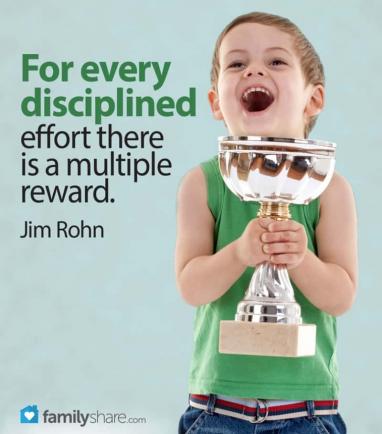
Do you remember getting a gold star when you were a kid? Perhaps your teacher put it on your math test, or better yet, she put it right on your forehead. The whole world knew that you had accomplished something worthwhile. Didn't it make you feel great?
We live in a rewards-based world. As humans, we all crave recognition for our hard work and achievements. It feels good when we get a promotion or a raise, are named Employee of the Month, or get a good performance review from our boss.
Our children feel the same way. Children have a natural and innate desire for our approval. As parents, we have a natural and innate desire to teach our children to become honorable contributors to society. Using rewards appropriately can be a powerful tool to help us guide our children.
Here are some suggestions for using rewards effectively.
Use external rewards when intrinsic (internal) motivation isn't enough
My son struggled with focus and impulse control. He wanted to improve his behavior and accomplish tasks such as cleaning his room or controlling his temper. However, it was difficult for him to find the motivation and self-control to achieve it. He loved it when we introduced goal charts. He took pride in each sticker that he earned. He looked forward to the external rewards, but he also took satisfaction in his accomplishments.
Let your child guide the process
Rewards should not be used to manipulate your child. Instead, let her choose the goals that she would like to work on. She will be more likely to succeed if the desire comes from her. Let her also choose the reward. Rewards that she selects herself are the most powerful.
Don't nag. If you find that you have to beg or threaten her to keep up with the goal chart, then it isn't working.
Tie rewards to short-term, specific, and measurable goals
Rewards are not intended to be a long-term fix, but rather a transition to the behavior you want to see from your child. Choose a goal that allows you to measure your child's progress. Reward your child not only for the final goal, but also for his progress and efforts along the way.
Focus on the behavior, not on the individual
Be careful that you do not label your child. Encourage his hard work and efforts by praising or rewarding his actions. For example, instead of saying, "You are a hard worker,"� you can say, "I can see how hard you worked to do that. You must feel proud of yourself."� Avoid making your child feel like he's "good"� when he complies and "bad"� when he fails.
Encourage intrinsic (internal) as well as extrinsic (external) rewards
Rewards will not create intrinsic motivation, but they can enhance it. As your child works on her goal, point out the intrinsic rewards. For example, if your daughter is working on cleaning her room every day, you might want to point out how good it feels to do a job well, how nice it is to be able to easily find her toys, and how fun it is to be able to play without worrying about an unfinished task.
Teach supporting skills
There is a reason your child has not been successful at mastering a behavior in the past. Offering a reward without supplying the skills to achieve the goal will only set him up for failure. Teach your child the tools he needs to succeed.
For example, if your son is trying to control his temper, you might want to teach him how to take ten deep breaths when he is feeling angry. Or if your daughter is struggling to get her homework finished each day, you might want to give her a timer. Have her set it for ten minutes, and have her work until the timer goes off. Then she can use the timer to take a ten-minute break, and then return to her homework for ten more minutes.
Surprise your child with an unexpected reward
The most effective rewards are those that are not expected. Pay attention to your child and catch him behaving the way you want to reinforce. Offer him specific praise or a reward for his behavior. For example, if your daughter has cleaned her room really well all week, you might want to tell her she could have a friend over and you'll order pizza.
Use rewards sparingly
When you use rewards too often, you can destroy your child's natural motivation. With too many rewards, children begin to feel entitled and stop listening to their inner voice.
Rewards, when used appropriately, can be an effective tool in your parenting toolbox. For some great suggestions for creative rewards, visit Child Development Institute's Parenting Today.

